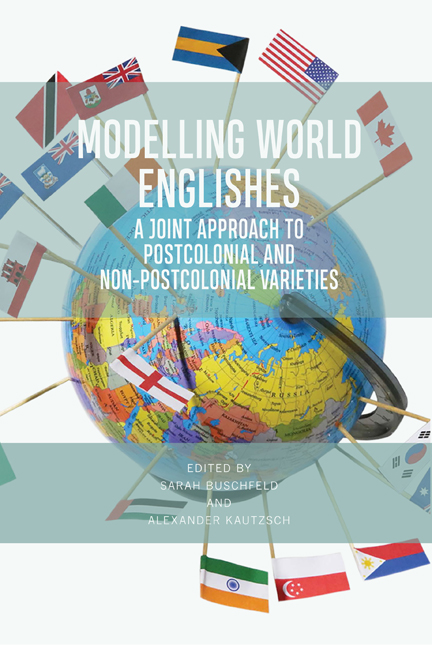Book contents
- Frontmatter
- Contents
- List of Figures and Tables
- List of Contributors
- Foreword
- 1 Introduction
- 2 English in England: The Parent Perspective
- 3 English in Namibia: Multilingualism and Ethnic Variation in the Extra- and Intra-territorial Forces Model
- 4 English in the United Arab Emirates: Status and Functions
- 5 English in India: Global Aspirations, Local Identities at the Grassroots
- 6 English in Singapore: Two Issues for the EIF Model
- 7 English in the Philippines: A Case of Rootedness and Routedness
- 8 English in South Korea: Applying the EIF Model
- 9 English in Japan: The Applicability of the EIF Model
- 10 English in Australia – Extra-territorial Influences
- 11 English in North America: Accounting for its Evolution
- 12 English in The Bahamas and Developmental Models of World Englishes: A Critical Analysis
- 13 Standard English in Trinidad: Multinormativity, Translocality, and Implications for the Dynamic Model and the EIF Model
- 14 Englishes in Tristan da Cunha, St Helena, Bermuda and the Falkland Islands: PCE, non-PCE or both? Blurred Boundaries in the Atlantic
- 15 English in Ireland: Intra-territorial Perspectives on Language Contact
- 16 English in Gibraltar: Applying the EIF Model to English in Non-Postcolonial Overseas Territories
- 17 English in Ghana: Extra- and Intra-territorial Forces in a Developmental Perspective
- 18 Synopsis: Fine-tuning the EIF Model
- Index
13 - Standard English in Trinidad: Multinormativity, Translocality, and Implications for the Dynamic Model and the EIF Model
Published online by Cambridge University Press: 24 September 2020
- Frontmatter
- Contents
- List of Figures and Tables
- List of Contributors
- Foreword
- 1 Introduction
- 2 English in England: The Parent Perspective
- 3 English in Namibia: Multilingualism and Ethnic Variation in the Extra- and Intra-territorial Forces Model
- 4 English in the United Arab Emirates: Status and Functions
- 5 English in India: Global Aspirations, Local Identities at the Grassroots
- 6 English in Singapore: Two Issues for the EIF Model
- 7 English in the Philippines: A Case of Rootedness and Routedness
- 8 English in South Korea: Applying the EIF Model
- 9 English in Japan: The Applicability of the EIF Model
- 10 English in Australia – Extra-territorial Influences
- 11 English in North America: Accounting for its Evolution
- 12 English in The Bahamas and Developmental Models of World Englishes: A Critical Analysis
- 13 Standard English in Trinidad: Multinormativity, Translocality, and Implications for the Dynamic Model and the EIF Model
- 14 Englishes in Tristan da Cunha, St Helena, Bermuda and the Falkland Islands: PCE, non-PCE or both? Blurred Boundaries in the Atlantic
- 15 English in Ireland: Intra-territorial Perspectives on Language Contact
- 16 English in Gibraltar: Applying the EIF Model to English in Non-Postcolonial Overseas Territories
- 17 English in Ghana: Extra- and Intra-territorial Forces in a Developmental Perspective
- 18 Synopsis: Fine-tuning the EIF Model
- Index
Summary
INTRODUCTION
This chapter aims at testing and applying the Dynamic Model (Schneider 2007) and the recently introduced Extra- and Intra-territorial Forces (EIF) Model (Buschfeld and Kautzsch 2017; Buschfeld et al. 2018) to the Caribbean island of Trinidad. With a focus on Standard English (as opposed to Trinidadian English Creole [TEC]), the findings of a largescale attitude study conducted in the Trinidadian education context are combined with discussions of World Englishes models; empirical investigations in which these models were explicitly put to test were also taken into account.
This study provides an instructive case for World Englishes theorizing and model making for a number of reasons: first, given the complexity and dynamics of English in Trinidad and the wider anglophone Caribbean, Trinidadian English (TrinE) may serve as a potential example of a less prototypical postcolonial variety of English whose developments the EIF Model explicitly claims to account for as well (Buschfeld and Kautzsch 2017: 121). That is, placing English(es) in the Caribbean within categories and models of World Englishes has always been somewhat challenging. Traditional notions of English as a Native (ENL), English as a Second (ESL), or English as a Foreign Language (EFL) do not apply to the multivarietal speech communities of the English-speaking Caribbean where emerging Englishes coexist with English-based creoles along a continuum of sociolinguistic variation (Deuber 2014: 11) and the use of English, its functions, and social meanings are context-dependent and variable (Westphal 2017: 204). Second, the study allows for discussions of processes of norm ( re-)orientation and standardization in small postcolonial speech communities where different local, regional, and global forces and norms interact (e.g. Mair 2013: 258; Hackert 2016: 106) and where linguistic emancipation processes have been shown to manifest in complex and diverse ways that may go beyond the traditional developmental path often anticipated in World Englishes models (Hundt et al. 2015; Mair 2017: 8; Westphal 2017: 224). Third, language attitudes and ideologies are fundamentally important for examining standardization processes (Schreier 2012: 357), investigating variety status, situating emerging varieties within models of World Englishes (Hundt et al. 2015: 705; Buschfeld and Schneider 2018: 41), and, therefore, also for testing such models.
- Type
- Chapter
- Information
- Modelling World EnglishesA Joint Approach to Postcolonial and Non-Postcolonial Varieties, pp. 274 - 297Publisher: Edinburgh University PressPrint publication year: 2020



